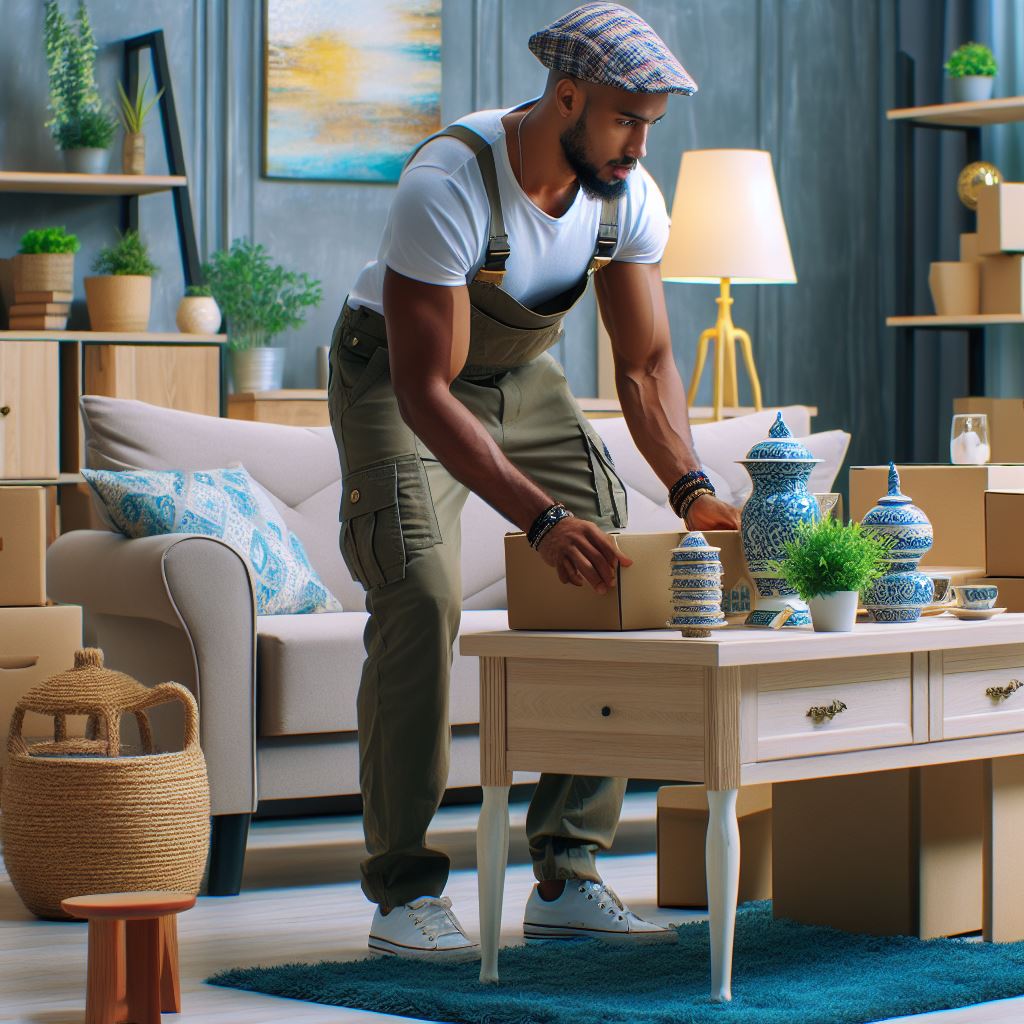Introduction
In this blog post, we will explore Cost Effective Tips Furnishing a Home.
Furnishing a home in Nigeria encompasses more than just decorating; it symbolizes identity and comfort.
Nigerians value the aesthetic appeal and functionality of their living spaces, reflecting their cultural heritage through vibrant colors, intricate designs, and traditional motifs.
However, this endeavor isn’t devoid of challenges. The cost of quality furniture and decor items can be exorbitant, especially for those on a tight budget.
Additionally, finding reliable suppliers or craftsmen who offer both quality and affordability can pose a significant challenge.
Considering these obstacles, this blog aims to provide actionable and pragmatic tips tailored to the Nigerian context.
It seeks to empower individuals with insights and strategies to furnish their homes without breaking the bank.
From leveraging local markets to embracing DIY techniques and exploring second-hand options, the blog will explore diverse avenues to acquire stylish and durable furnishings at reasonable prices.
Suggestions such as repurposing items or engaging local artisans for custom-made pieces will be highlighted, emphasizing the fusion of affordability and uniqueness.
Furthermore, the blog will delve into the significance of bargaining in Nigerian markets, guiding readers on effective negotiation tactics to secure better deals without compromising quality.
Ultimately, the purpose of this blog is to assist individuals in creating inviting and aesthetically pleasing living spaces while being mindful of financial constraints.
By offering practical solutions and cost-effective approaches, the aim is to enable readers to transform their homes into cozy havens that reflect their style and cultural heritage, all within a budget that suits their means.
Determining Your Budget
The need for setting a budget before starting the furnishing process
Furnishing a home in Nigeria can be an exciting yet overwhelming task.
With so many options and styles to choose from, it’s easy to get carried away and overspend.
That’s why it’s crucial to determine a budget before diving into the furnishing process.
Your Personalized Financial Plan
Get expert financial advice tailored exclusively to your goals. Receive a custom roadmap in just 1-3 business days.
Get StartedBy setting a budget, you’ll be able to make smarter choices and ensure that you don’t end up breaking the bank.
Factors to consider when determining the budget (e.g., size of the home, personal finances)
When determining your budget for furnishing a home in Nigeria, there are several factors to consider.
The size of your home is one of the most important factors. A larger home will require more furniture and decorative items, ultimately impacting the overall cost.
Additionally, it’s essential to assess your personal finances and decide how much you are willing and able to spend on furnishing your home.
Cost-effective tips to help you determine your budget
- Create a list of necessary items: Make a list of essential furniture and decor items that are needed for your home.
Prioritize these items based on their importance and allocate a portion of your budget accordingly. - Research prices: Before finalizing your budget, research prices of different furniture stores, both online and offline.
This will give you an idea of the price range and help you make an informed decision. - Consider quality versus price: While it may be tempting to opt for cheaper furniture options, it is important to consider the quality and durability of the items.
Investing in higher-quality pieces might cost more initially but can save you money in the long run. - Factor in additional expenses: When setting your budget, remember to account for additional expenses such as delivery charges, assembly fees, and any customization or alterations you may want.
- Explore alternative options: Don’t limit yourself to new furniture only. Consider checking out thrift stores, flea markets, or online platforms that offer second-hand furniture.
You might find unique and affordable pieces that can fit well within your budget. - Stick to your budget: It’s easy to get carried away when shopping for furniture. However, it is crucial to stick to your budget to avoid overspending.
Be disciplined and resist the temptation to make impulse purchases.
In essence, determining your budget before furnishing your home in Nigeria is essential to make informed decisions and avoid unnecessary expenses.
Consider factors such as the size of your home and personal finances when setting your budget.
Follow the cost-effective tips mentioned above and stay within your budget while creating a comfortable and stylish home.
Read: Internet and Mobile Data: Finding the Best Deals
Shopping for Furniture
Research local furniture stores and online platforms
- Start by researching local furniture stores in your area or nearby cities.
- Look for online platforms that sell furniture, such as e-commerce websites or social media pages.
- Make a list of potential stores and platforms to visit or explore further.
Comparing prices, quality, and reviews of different furniture options
- When visiting furniture stores, compare the prices of similar items across different stores.
- Consider the quality of the furniture by examining materials used, durability, and craftsmanship.
- Look for customer reviews online to gain insights into the experiences of other buyers with the furniture.
Negotiating prices and looking for discounts or sales
- Don’t be afraid to negotiate prices with sellers, especially if you’re buying multiple items or high-value pieces.
- Research the market value of the furniture you want to buy to have a better understanding of a fair price.
- Keep an eye out for discounts or sales, both in-store and online, as they can significantly reduce the cost.
Finding cost-effective furniture options in Nigeria requires careful research and comparison.
By exploring local stores and online platforms, comparing prices and quality, and utilizing negotiation techniques and discounts, you can furnish your home without breaking the bank.
Remember, it’s essential to assess the overall value and ensure that the furniture meets your needs and style preferences. Happy furniture shopping!
Prioritizing Essential Pieces
Essential furniture items for each room of the house (e.g., beds, sofas, dining table)
When furnishing a home in Nigeria, it is important to prioritize the essential furniture pieces for each room.
These items include beds for the bedrooms, sofas for the living room, and a dining table for the dining area.
Importance of prioritizing these items first within the budget
Prioritizing these essential items within the budget is crucial for several reasons.
Unlock a Debt-Free Future with Our Unique Strategies
Imagine a life unburdened by debt—a reality we help you visualize and achieve. We offer personalized strategies tailored to your unique situation, guiding you step-by-step toward financial freedom.
Start TodayFirstly, these are the items that are used on a daily basis and are essential for a comfortable living.
By allocating the majority of the budget to these pieces, you ensure that your basic needs are met.
Additionally, by prioritizing these items, you can make sure that the most important rooms are furnished first.
For example, furnishing the bedrooms and living room takes priority over less frequently used rooms like the guest room or home office.
This way, you can start enjoying your space immediately while saving up for the next phase of furnishing.
Moreover, by focusing on essential pieces, you can maintain a cohesive and functional living environment.
These items serve as the foundation of your home decor and provide the necessary functionality for each room.
Prioritizing essential furniture pieces within your budget
To further assist you in prioritizing essential furniture pieces within your budget, here are some guidelines:
- Make a list: Write down all the necessary furniture items for each room.
This will help you visualize what you need and prevent overspending on unnecessary items. - Consider quality: Invest in durable and high-quality furniture that will last longer.
It is better to spend a little more on a reliable piece rather than replacing it frequently. - Research prices: Before making any purchases, research the prices of different furniture options.
Compare prices from different stores or online platforms to find the best deals. - Look for sales and discounts: Take advantage of sales, discounts, or clearance events to save money on essential furniture pieces.
Timing your purchases strategically can help you get the best value for your money. - Explore second-hand options: Consider buying gently used furniture items.
Websites, social media groups, and thrift stores are great places to find affordable, pre-loved pieces that still have plenty of life left in them. - DIY projects: Get creative and try your hand at do-it-yourself projects.
Repurposing old furniture or adding a personal touch to new pieces can save you money and make your home unique.
By following these tips, you can prioritize essential furniture pieces while staying within your budget when furnishing your home in Nigeria.
Remember, creating a comfortable and functional living space doesn’t have to break the bank.
Read: Healthcare Costs: Planning for Medical Expenses
Consider Second-Hand or Pre-Owned Furniture
Benefits of Buying Second-Hand Furniture in Nigeria
- Lower cost: Purchasing second-hand furniture can significantly reduce your overall expenses.
- Sustainability: Opting for pre-owned furniture promotes eco-friendly practices by reducing waste and carbon footprint.
- Unique style: Second-hand furniture offers a chance to create a distinct and personalized home aesthetic.
Tips for Finding Reliable Sources of Second-Hand Furniture
- Online platforms: Utilize websites such as Konga, Jiji, and OLX that offer a wide selection of second-hand furniture.
- Thrift stores: Visit local thrift stores like Yaba Market in Lagos or Wuse Market in Abuja for affordable and unique finds.
- Garage sales: Keep an eye out for garage sales happening in your neighborhood to score great deals on furniture.
- Word of mouth: Inform friends, family, and colleagues about your search for second-hand furniture as they may have recommendations.
List of Trustworthy Online Platforms to Find Second-Hand Furniture
- Konga: One of Nigeria’s largest e-commerce platforms that also sells pre-owned furniture.
- Jiji: A popular online classifieds platform with a wide range of second-hand furniture listings.
- OLX: Another reputable online marketplace where you can find affordable second-hand furniture.
Tips for Ensuring Quality when Buying Second-Hand Furniture
- Inspect thoroughly: Examine the furniture for any signs of damage, wear, or infestations.
- Test functionality: Check if drawers, doors, and other functional parts are in proper working condition.
- Measure accurately: Confirm that the furniture will fit within your space by measuring dimensions beforehand.
- Inquire about history: Ask the seller for information about the furniture’s age, previous owners, and maintenance history.
- Negotiate the price: Don’t hesitate to negotiate the price to ensure you’re getting a fair deal.
Considering second-hand or pre-owned furniture is a cost-effective and sustainable choice when furnishing a home in Nigeria.
The benefits of lower costs, environmental consciousness, and the opportunity to reflect your personal style make it a favorable option.
By utilizing reliable sources such as online platforms, thrift stores, and garage sales, you can find quality second-hand furniture.
Unlock Untapped Nigerian Wealth with Our Expert Advice
Imagine accessing investment opportunities others overlook—stocks, bonds, real estate, small businesses tailored to you. We offer personalized advice you won't find elsewhere, guiding you to financial success.
Unlock WealthPrioritize thorough inspection and effective communication with sellers to ensure a satisfying purchase.
So, embrace the second-hand furniture market in Nigeria and transform your home without breaking the bank.
DIY and Repurposing
Consider do-it-yourself (DIY) projects for furniture or decorations
- Saving Costs with DIY: Embrace your creativity and take on DIY projects for furnishing your home.
- Personalized Touch: DIY allows you to tailor your furniture and decorations to your personal style.
- Online Resources: Explore online platforms for DIY ideas, tutorials, and step-by-step instructions.
- Repurpose Old Items: Look for furniture or items around your home that can be repurposed.
Repurposing old furniture or items to save costs
- Hidden Gems: Give new life to old furniture that may be hiding in your attic or storage.
- Upcycling Benefits: Repurposing not only saves money but also reduces waste and promotes sustainability.
- Refurbishing Techniques: Learn techniques like painting, reupholstering, or refinishing to transform old items.
- Functional Makeovers: Convert unused objects into functional pieces, such as turning old ladders into bookshelves.
Creative ideas and resources for DIY and repurposing projects
- Thrifty Shopping: Visit thrift stores, flea markets, or garage sales to find unique items for repurposing.
- DIY Storage Solutions: Build storage units or shelves using crates, pallets, or unused wooden planks.
- Handmade Decor: Create personalized decorations like artwork, wall hangings, or customized photo frames.
- Repurposed Lighting: Convert old bottles, mason jars, or even kitchen utensils into unique lighting fixtures.
- Outdoor Projects: Repurpose old tires into planters or transform wooden pallets into garden furniture.
By embracing DIY and repurposing, you can furnish your home in Nigeria without breaking the bank.
Read: Transportation Costs in Nigeria: A 2024 Overview

Renting or Leasing Furniture
Option of renting or leasing furniture for a temporary or flexible solution
- Cost-effective: Renting furniture can be a more affordable option than buying all-new furniture.
- Flexibility: Renting furniture allows you to easily change your home decor whenever you want.
- Temporary solution: If you plan to stay in Nigeria for a short period, renting furniture makes more sense.
- Less maintenance: With rented furniture, you don’t have to worry about repairs or replacement costs.
- Variety: Renting allows you to experiment with different furniture styles without committing to a purchase.
Benefits and limitations of renting furniture in Nigeria
Advantages
- Budget-friendly: Renting furniture saves you from making a big investment upfront.
- Convenience: Rental companies provide delivery, assembly, and pickup services for a hassle-free experience.
- Quality: Renting from reputable companies ensures you get high-quality, well-maintained furniture.
- Easy upgrade: Renting allows you to upgrade to newer or better furniture options whenever you desire.
- No resale worries: When you leave Nigeria, you don’t have to go through the hassle of selling your furniture.
Limitations
- Limited customization: Rental furniture options may limit you in terms of customization and personalization.
- Availability constraints: The variety of rental furniture available in Nigeria might be limited.
- Potential damage charges: If you damage rented furniture, you may have to pay additional fees for repairs.
- Cost in the long run: While renting is cost-effective for the short term, it may become expensive in the long run.
- Ownership desire: Some individuals prefer owning their furniture for a sense of permanence and personal touch.
In short, renting or leasing furniture in Nigeria offers cost-effective and flexible solutions for those looking to furnish their homes.
It allows you to experiment with different styles without committing to a purchase, making it suitable for temporary stays or individuals on a budget.
Renting eliminates the worries of maintenance and provides convenience through delivery and pickup services.
However, limitations like limited customization options and potential damage charges should be considered.
Ultimately, your decision should be based on your specific needs and preferences.
Read: Saving on Utilities: Tips for Nigerian Homes
Accessories and Decorations on a Budget
Tips for Finding Affordable Accessories and Decorations
- Explore local markets and flea markets for unique and affordable accessories.
- Take advantage of clearance sales in home decor stores to find discounted decorations.
- Consider purchasing second-hand accessories from thrift stores or online platforms.
- Participate in online communities and forums where people exchange or sell their pre-loved decorations.
- DIY your own accessories using inexpensive materials like recycled bottles, fabric scraps, or old picture frames.
The Importance of Prioritizing Essential Accessories
When furnishing a home on a budget, it is crucial to prioritize essential accessories based on personal taste and style.
By focusing on what truly matters to you, you can create a beautiful and functional space without overspending.
- Start by identifying the key areas in your home that require accessories and decorations.
- Consider the purpose of each space and the atmosphere you want to create.
- Make a list of must-have accessories that will enhance the functionality and aesthetics of the room.
- Invest in high-quality essential items that withstand the test of time.
- Allocate a specific budget for accessories and stick to it to avoid overspending.
Remember, less is more! Instead of filling every inch of your home with decorative items, prioritize quality over quantity.
Focus on a few statement pieces that reflect your personal style and add character to the space.
Here are some examples of essential accessories to consider:
- Statement artwork or a gallery wall to add visual interest to your walls.
- Well-placed mirrors to create an illusion of space and amplify natural light.
- Cozy rugs and throw pillows to add warmth and comfort to living areas.
- Functional storage solutions such as baskets or storage ottomans to declutter your space.
- Lighting fixtures that not only provide adequate illumination but also serve as decorative elements.
By focusing your budget on these essential accessories, you can create a stylish and inviting home without breaking the bank.
In general, furnishing a home in Nigeria on a budget doesn’t mean compromising on style.
With careful planning and prioritizing, you can find affordable accessories and decorations that reflect your personal taste and style.
Remember, it’s not about the price tag, but how these items contribute to the overall look and feel of your home.
Maintenance and Upkeep
Maintenance tips to extend the lifespan of furniture
- Regularly dust and clean furniture with a soft cloth to prevent the accumulation of dirt and dust particles.
- Avoid placing furniture near direct sunlight or heat sources to prevent fading or warping.
- Use coasters or placemats to protect the surface of tables and avoid water rings or scratches.
- Arrange furniture in a way that allows for easy movement and access to avoid unnecessary strain or damage.
- Tighten loose screws or hinges regularly to ensure stability and prevent any potential accidents.
- Keep furniture away from high-traffic areas or areas prone to spills to minimize the risk of stains and damages.
- Avoid dragging or slamming furniture to prevent scratches or structural damage.
- Upholstered furniture should be regularly vacuumed and spot cleaned to maintain its appearance and cleanliness.
- Apply furniture polish or wax periodically to protect the finish and keep it looking fresh.
Cost-effective cleaning and care products
- Look for multi-purpose cleaners that are suitable for various furniture surfaces to save money.
- Use natural cleaning solutions like vinegar and water mixture for a budget-friendly alternative.
- Invest in fabric protection sprays to minimize stains and make cleaning easier.
Regular maintenance routines to prevent costly damages
- Create a schedule for deep cleaning and regular maintenance tasks to keep your furniture in good condition.
- Inspect furniture for any signs of wear and tear or damage, such as loose joints or broken parts.
- Promptly address any spills or stains by blotting them immediately and treating them with appropriate cleaning agents.
- Keep pets away from furniture or use protective covers to avoid scratches or pet hair buildup.
- Avoid placing heavy or sharp objects on furniture surfaces to prevent dents and scratches.
- Regularly rotate cushions or pillows to distribute wear evenly and maintain their shape.
- Check furniture warranties and follow any recommended care instructions to ensure coverage.
In review, proper maintenance and upkeep play a significant role in extending the lifespan of your furniture.
By following these cost-effective tips, you can preserve the beauty and functionality of your furnishings while avoiding costly damages or replacements.
Remember to establish regular maintenance routines, use suitable cleaning products, and implement preventative measures to keep your furniture looking its best for years to come.
Conclusion
Cost-Effective Tips Recap
To sum up, here are quick, budget-friendly tips: thrift stores, local markets, and online discounts. Repurpose and refurbish existing furniture for a unique touch.
Embrace DIY projects, like painting or reupholstering, to revamp old items inexpensively. Seek out local craftsmen and artisans for custom-made, affordable pieces.
Consider renting or borrowing furniture for temporary needs.
Embrace Creativity and Resourcefulness
Readers, harness your creativity and resourcefulness! Explore unconventional avenues for unique finds.
Think outside the box when combining items for a personalized touch. Incorporate local art and crafts, showcasing Nigeria’s rich cultural heritage.
DIY can transform ordinary objects into extraordinary decor. Engage in community initiatives or swap meets for furniture exchange, fostering a collaborative spirit.
Stay Within the Budget
Remember, sticking to a predetermined budget is crucial. Prioritize needs over wants and invest wisely.
Budgeting ensures financial stability and prevents overspending. Be mindful of hidden costs and opt for practical choices.
Flexibility in planning allows for adjustments without compromising quality.
Uphold financial discipline while furnishing your home to avoid unnecessary financial strain. Furnishing your home in Nigeria need not break the bank.
By exploring diverse options, leveraging creativity, and adhering to a budget, you can achieve a stylish and cozy living space.
Embrace the unique cultural essence of Nigeria through your decor choices.
Be prudent, be creative, and enjoy the process of making your house a comfortable home!




